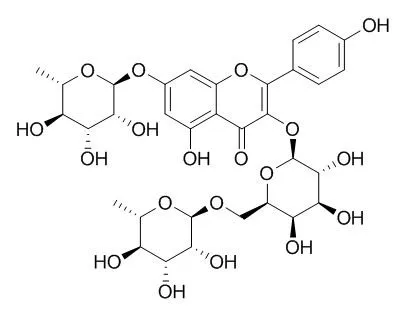| Description: |
Robinin has cardioprotective effect on doxorubicin-induced cardiac toxicity by modulating TGF-β1 signaling pathway in Sprague Dawley rats. Robinin has protective effect against the ox-LDL induced inflammation stress in hPBMCs by inhibiting TLR4-NF-κB signaling pathway.
|
| Targets: |
TLR | NF-kB | LDL | COX | LOX | NOS | PGE | p65 | TGF-β/Smad |
| In vitro: |
| Int Immunopharmacol. 2014 Jan;18(1):191-7. | | Robinin modulates TLR/NF-κB signaling pathway in oxidized LDL induced human peripheral blood mononuclear cells.[Pubmed: 24295649] | This study was designed to investigate whether Robinin administration modulates toll-like receptor (TLR) and nuclear factor-kappa B (NF-κB) signaling pathway in oxidized LDL induced human peripheral blood mononuclear cells (hPBMCs).
METHODS AND RESULTS:
The hPBMCs were isolated from healthy human volunteers and the cells were cultured in collagen coated plates at 37°C with 5% CO2 and RPMI as culture medium and were grouped as follows: Group I - control, group II - OxLDL treated and group III - OxLDL+Robinin (6μg/ml). We measured mRNA expression of TLR2 and TLR4 by reverse-transcriptase polymerase chain reaction (RT-PCR) and NF-κB transcription factor assay (ELISA), and western blotting studies were done for knowing expression of monocyte chemotactic protein-1 (MCP 1), tumor necrosis factor-alpha (TNF-α) interleukin-6 (IL-6) and vascular cell adhesion molecule 1 (VCAM-1). The result indicates that OxLDL that induces hPBMCs showed an upregulated expression of TLR2, TLR4, NF-κB, pro-inflammatory cytokines and VCAM-1.
CONCLUSIONS:
Robinin inhibited the ox-LDL induced TLR2 and TLR4 expression at mRNA level and inhibited the translocation of NF-κB p65 by modulating the TLR-NF-κB signaling pathway thereby inhibiting cytokine production and down regulated inflammatory enzymes like cyclooxygenase (COX), lipoxygenase (LOX), nitric oxide synthase (NOS) and prostaglandin E2 (PGE2), thus having protective effect against the ox-LDL induced inflammation stress in hPBMCs by inhibiting TLR4-NF-κB signaling pathway. |
|
| In vivo: |
| Biomed Pharmacother. 2014 Oct;68(8):989-98. | | Robinin modulates doxorubicin-induced cardiac apoptosis by TGF-β1 signaling pathway in Sprague Dawley rats.[Pubmed: 25443416] | The study focussed on the cardioprotective effect of Robinin on doxorubicin-induced cardio-toxicity in Sprague Dawley rats.
METHODS AND RESULTS:
After the experimental period, animals were sacrificed and the various parameters such as cardiac markers, toxicity parameters, antioxidant status, ROS generation, lipid peroxidation status and inflammatory parameters were assessed. Gene expression study by RT-PCR analysis and proteins expression study by western blotting were done. Doxorubicin causes significant increase in the levels of cardiac marker enzymes, namely lactate dehydrogenase (LDH), creatine phospokinase (CPK), toxicity parameters like serum glutamate oxaloacetate transaminase (SGOT) and serum glutamate pyruvate transaminase (SGPT). Antioxidant enzyme levels were decreased; lipid peroxidation products in heart tissue and inflammatory markers, namely cyclooxygenase (COX2) and lipooxygenase (LOX15) were significantly increased. Gene expression study by RT-PCR analysis of transforming growth factor-β1 (TGF-β1), Smad2, murine double minute (Mdm2), Smad3, cyclin-dependent kinase inhibitor 2A (CDKN2A), Smad4 and Smad7 were significantly altered. The western blotting study of p53, Bcl-2 and Bax also showed altered expression. The supplementation of the Robinin along with DOX caused normalised level of all the above parameters and cardio-toxicity.
CONCLUSIONS:
This study revealed the cardioprotective nature of Robinin on doxorubicin-induced cardiac toxicity by modulating TGF-β1 signaling pathway in Sprague Dawley rats. |
|






 Cell. 2018 Jan 11;172(1-2):249-261.e12. doi: 10.1016/j.cell.2017.12.019.IF=36.216(2019)
Cell. 2018 Jan 11;172(1-2):249-261.e12. doi: 10.1016/j.cell.2017.12.019.IF=36.216(2019) Cell Metab. 2020 Mar 3;31(3):534-548.e5. doi: 10.1016/j.cmet.2020.01.002.IF=22.415(2019)
Cell Metab. 2020 Mar 3;31(3):534-548.e5. doi: 10.1016/j.cmet.2020.01.002.IF=22.415(2019) Mol Cell. 2017 Nov 16;68(4):673-685.e6. doi: 10.1016/j.molcel.2017.10.022.IF=14.548(2019)
Mol Cell. 2017 Nov 16;68(4):673-685.e6. doi: 10.1016/j.molcel.2017.10.022.IF=14.548(2019)